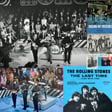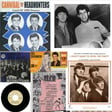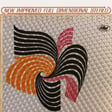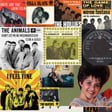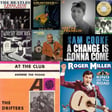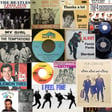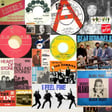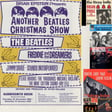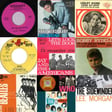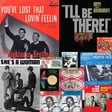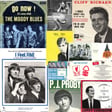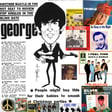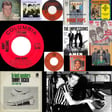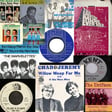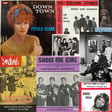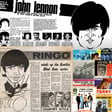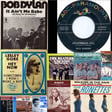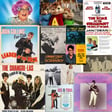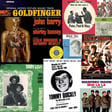Become a Creator today!Start creating today - Share your story with the world!
Start for free
00:00:00
00:00:01

September 1964 (side A)
The British charts for September of 1964 are here! Two years since "Love Me Do", and now the Beatles are the top band around the World, and Britain was the home of the biggest pop stars! The Beatles, The Dave Clark 5, the NEMS stable, and maybe a little bit of Old Blue Eyes as well.... Please support this podcast by joining our patreon, or following our zencastr link if you want to create your own show! https://www.patreon.com/toppermostpodcast #madeonzencastr Create your podcast today! #madeonzencastr
Recommended
Transcript
The Beatles' Rallying Call
00:00:00
Speaker
The Beatles had this chant, John Paul and George, and probably then Stuart and Pete had this chant when things weren't going well, which in their world wasn't very often because mostly it was an upward trajectory, but nonetheless, sometimes, you know, they would have a bad night or the gig would, you know, it didn't work properly or the amps broke or whatever. I say, where are we going, fellas? And they'd go to the top, Johnny. And I say, where's that, fellas? And they say to the top of most of the papamos. And right. And we'd all sort of cheer up.
00:00:31
Speaker
Where are we going fellas? To the top! What top? To the top! Now this chant and John would say where are we going fellas and the others in an American accent and the others would say to the top Johnny get the exact wording right um where's that fellas to the topper most of the papa most Johnny And that was their rallying call in when times were bad to kind of, yes, you know, we're still here. We're still together. A lot of irony in it as well. It was kind of done in a heavy American accent as a sender.
Podcast Introduction
00:01:12
Speaker
Welcome to Toppermose of the Popermose, September of 1964. Side A, I'm Ed Chan. I'm Kirill Chul. And I'm Martin Quabel. Before we get into the fun stuff, our feature this month is looking back at the year and what a year it was. We wanted to bring up our Fest Find from this year's Fest for Beatles fans. We got a poster, well, Kit got a poster for a film called Disco Tech Holiday.
00:01:47
Speaker
What a title. It was released in the States in 1966, but it was actually a 1964 British film entitled Just For You. So is that poster just for you then, Kit? That's right. Just for me.
00:02:04
Speaker
Now, the interesting thing about this poster and about the film, we're going to do something on this film somewhere along the way. Oh, we have to. Just you wait. But first off, that clip, which I thought was a thing made for a children's show in the States, was actually not. It was a Freddie and the Dreamers clip just for you, the incredibly creepy Freddie and the Dreamers clip. And it was part of this film. Wow. No kidding. I didn't know that.
00:02:33
Speaker
Well, that explains the production value. You know, I thought this was awfully high class for something which was just done on a set for a Boston area children's show. Yeah. And so that explains a lot, but it's just amazing this poster because it has
British and American Film Releases
00:02:51
Speaker
so many of the artists that we have talked about on this show. I mean, it is an all star lineup.
00:02:59
Speaker
It explains why it looks like a sort of clip that would scare the heck out of David Lynch.
00:03:08
Speaker
ah So the acts mentioned in the British version, in the Just For You version of this poster include Peter and Gordon, The Bachelors, Millie Smalls, Freddie and the Dreamers, as mentioned, and a band called The Warriors. The Warriors. Warriors, Warriors.
00:03:26
Speaker
Come out to play.
The Warriors' Musical Legacy
00:03:27
Speaker
i see Now the interesting thing about the Warriors, this was John Anderson of Yes's first band. Wow. Was it full of good people?
00:03:38
Speaker
Some of the other members of the band also went on to significant careers in Prague. Tony Anderson John's brother was in Los Bravos. Brian Chaton, the keyboard player, would play with Phil Collins and Ronnie Carroll in Flaming Youth. Wow. ah Then joined the Nicely Jackson in Jackson Heights. Jackson Heights, where to then?
00:04:02
Speaker
Ian Wallace of King Crimson and later to be Bob Dylan's drummer was in The Warriors. Oh my gosh. David Foster, who would be in Badger and later ex-Yes keyboardist Tony Kay was on bass. Yep. That's not David Foster, the record producer, by the way. We cannot claim a Beatles connection there except a homophone Beatles connection. Right. Nice. English lessons with Ed.
00:04:31
Speaker
ah well You guys are the ones who are always complaining about grammar in these things. That's right. Very true. And then there were two guitarists, Rod Hill and Mike Brereton, who, as far as I know, did not make any significant inroads in Prague.
00:04:47
Speaker
We will do something probably not on the proper feed, but we'll do something in our Patreon somewhere in the not too distant future. The film came out mid-year, April, May, June, pretty hard day's night. And then in the States, it would not show up until 1966. Wow.
Beatles' UK Chart Success in 1964
00:05:07
Speaker
Interesting. that Yeah, that's quite a time lag. So on to our future. And as becoming our tradition,
00:05:14
Speaker
every year in September or thereabouts. We look back at the year in the Beatles and what a year this was. What a year that they had the number of singles, Hard Day's Night, everything piled together. It's just astounding what they accomplished. The number of hit albums as well that they've released.
00:05:36
Speaker
So if you will go back a year ago, when we last left you in this feature, she loves you. Was it number one? And their next single was not out yet. Wow. Gosh. That's an important single. Yes. Absolutely. They also had not gone on a tour outside of the UK. That was still to come. And now all this happens. and Now there's all this. Here we go.
00:06:05
Speaker
We'll start with the UK side, because it's a little bit easier to summarize the UK side because, well, they'd been around for a year plus at that point in the ensuing year. I want to hold your hand. Can't buy any love. And Hard Day's Night all hit number one and Ain't She Sweet was in the charts. Absolutely. And then for the UK albums, Please, Please Me started in October 1963 at number one and it's still in the charts in the UK. A year later. That's right. With the Beatles spent 21 weeks at number one and is also still in the charts. Wow. And A Hard Day's Night is at number one this month and would spend 21 weeks at number one.
00:06:55
Speaker
All three of those are in the charts in October of 1964 then. Wow. Yes. Wow. And then the last piece of the British charts over the year of 1964, now this is not the year we're talking about, there's a couple months difference, but this holds the Beatles held the record with 168 EP weeks in the charts for the calendar year 1964. Jeez. Wow.
00:07:23
Speaker
You compare it to their nearest competitors. The Stones were next at 70 and Peter, Paul and Mary was third with 60 weeks. Wow. Amazing. Now the Beatles and Stones did seem to alternate in the placement of their EPs. Beatles hits was number one in November of 63 followed by twist and shout. And then in February, the Rolling Stones EP, The Rolling Stones, would spend three weeks at number one.
00:07:54
Speaker
All My Loving would follow and on February the 29th, which would then be displaced by the Rolling Stones, the same Rolling Stones EP, the Rolling Stones. Long Toss Sally would come along in July and in August, five by five by the Stones would take the top spot on the EP chart. Wow, they were killing it. That's for sure. Now on to the US
Beatles' US Chart Dominance in 1964
00:08:21
Speaker
charts. And there's a heck of a lot to talk about here.
00:08:24
Speaker
Get comfortable folks. ah Let's start with the LPs because that's a little bit easier to discuss. There were three separate number one LPs. And remember, this is really only eight months we're talking about. wow Meet the Beatles, second album and Hard Day's Night would all reach the top of the charts for a total of 30 weeks.
00:08:51
Speaker
Wow. The Hard Day's Night soundtrack would spend 14 weeks in the number one spot. Wow. All in all, Beatles albums would be at the top of the charts for more than half the year. Wow. Jeez. The Beatles also held the top two spots on both Billboard and the Hot 100 for nine weeks, making the only act to ever do so. Wow.
00:09:18
Speaker
So we can list some of those albums and and where they reach. Introducing would reach number two, the first iteration or first and a half iteration of VJ's Beatles album. And then we have Meet the Beatles, number one, The Beatles with Tony Sheridan and their guests with that number 68. Jolly what? The Beatles and Frank Eiffel on stage week. We cannot do a show without mentioning Frank Eiffel, of course.
00:09:47
Speaker
good old ah of course the Beatles second album which of course hit number one and the Beatles second album replaced meet the Beatles at number one on the top LPs chart in the US. We should also mention that there were two separate versions of the Frank I field album. There's the jolly what version which has a weird little cartoon of someone kind of like the Monopoly man with a big bushy mustache. on the front cover. And there's a version which has the PS I love you love me do single drawing on the front cover. They removed the jolly what it was just the Beatles and Frank Eifield on stage, although neither of them were actually on stage. Not a live album. Okay, I was gonna get looking for that as well then. think Oh, live Beatles.
00:10:38
Speaker
So that was then followed by A Hard Day's Night. As mentioned, it would stay in the top of the charts for a very long time. And that was the only thing that kept something new from the top spot. Something new was to reach number two, and it would spend nine weeks at number two. Wow. Only because it was being held off by A Hard Day's Night. Exactly. Cheers. Then you've got this... What's what's the Hear the Beatles Tell All? It's like an interview disc.
00:11:07
Speaker
Yeah. So VJ, once they had lost the rights to putting out Beatles music, they said, how can we still cash in on the Beatles?
VJ Records' Beatles Albums Variations
00:11:19
Speaker
They have an interview, which actually is not even a real interview. They they've cobbled together ah bits and pieces of clips from several places and put it out as an interview record. Okay.
00:11:32
Speaker
And Ain't She Sweet? what Is that like old pre-fading Beatles songs? Well, that's mostly non-Beetle stuff. That's MGM's attempt at a Beatles LP. They had the Sheridan tapes. And so they're going to augment them with other things. Wow. Not confusing at all. No, no, no. The next one's not confusing that either, is it? It's not really a fight at all. The Beatles versus the Four Seasons.
00:12:01
Speaker
one of the last reiterations. That's the other thing. You know, VJ kept putting out introducing in different versions, and by the time they hit the Beatles versus the Four Seasons, you think it would have been all sold out, but it wasn't. It still sold enough copies to hit number 142 in the album charts. The album charts were 200 at the time. Do you think Paul took lessons from this, and that's why he's released all these different versions of Band on the Run?
00:12:29
Speaker
ah The industry certainly took notice of what was going on. They sure did. The songs, pictures, and stories, which was yet another version of the same LP from VJ. I have that one. I have that one as well. Yeah. Be careful. The counterfeits abound. The counterfeits do not have the fold out cover.
00:12:50
Speaker
Right and they are just called songs and pictures and so just you don't get a gatefold. You don't get the stories. That's right. But you know that made it all the way to number 63. Yeah, I'm surprised it charted that high to quote Paul. It's the bloody Beatles.
00:13:06
Speaker
That's right. So Capitol, after they saw that VJ was releasing here, the Beatles tell, all they put out their own double LP, the Beatles story. Now that's a little bit later than the timeframe we're looking at. That's late 64, but even that would make it all the way to number seven.
00:13:26
Speaker
Wow, crazy. And then at the end of the year, Beatles 65 would come out and would top the charts, although that wouldn't be until late 64, early 65. So does that mean they're going to come out with a Beatles 66 in 1965? They could have called rubber sole Beatles 66. Yeah. But ah Brian and the Beatles had a little bit more juice with Capitol.
00:13:51
Speaker
Yeah. No matter what the deal with yesterday and today was, they knew that the contract was coming up for renegotiation. So it's like, okay, we better not piss these guys off too much any anymore. Right. The last of their thoughts being, Oh, we'll put together a Paul McCartney album, which also never happened.
00:14:12
Speaker
And we have to remember, these are not the only LPs which were making their way around the states from the Beatles. The British LPs were less common, but there were a handful of imports. But what we did see a fair bit of in the states, and we will hear more from our good friend Piers on this, is three LPs from capital of Canada.
00:14:35
Speaker
ah Yes, there were three LPs. There was Beatlemania with the Beatles, Twist and Shout, and Long Tall Sally. And if you go back and listen to our February and March shows, we talked a little bit about the drop shippers and how there was actually a big industry with bringing Beatles, singles, and LPs into the States and shipping them all across the country.
00:15:02
Speaker
Right. Fascinating conversation. And we will definitely have him back in the near future to discuss this really interesting. So you had those in the charts as well. And now the big list. Here we go. Yeah.
Unprecedented Beatles' US Chart Success
00:15:17
Speaker
All in all, in 1964, the Beatles had 30 separate entries in the Billboard Hot 100. Wow.
00:15:25
Speaker
Although at this point it was only 28. There were two more between now and the end of the year. here All of those 30 hits, 19 of them reached the top 40. There would be six number ones, although at this point it's only five. Four additional songs between number two and number 10, and 17 between number 11 and number 100. Has anyone ever released that many singles in one year?
00:15:52
Speaker
You can put this up against what they do these days. yeah I mean, it is almost here's every song off of the album. Plus some more. I think if we went and looked at what Taylor has done in the last year, it would be comparable. But again, you, we can't compare because it's a completely different ball game these days.
00:16:14
Speaker
which is not to take anything away from Taylor. you She's playing by the rules, which she is given. And in her own way, what she's doing is absolutely as impressive as what the Beatles did in 64. Absolutely. All right. So let's start in on this list. January the 18th. I want to hold your hand would be number one. And that would then.
00:16:36
Speaker
Be at the top of the charts from February 1st to March the 14th January 25th She Loves You came out and that would be number one on March the 21st to March the 28th So it was hold your hand followed immediately by She Loves You please please me released on February 1st would get to number three on March the 14th. I saw her standing there released on February 8th would get to number 14 on March the 21st. My Bonnie released on February the 15th would get to number 26 on March the 14th. For me to you it was released March 7th and hit number 41 on April 4th. Twist and Shout
00:17:23
Speaker
Released March 14th and it peaked at number two on April 4th. Rollover Beethoven, which was released March 21st and it peaked at number 68 on April 4th. I'm kind of surprised. I thought it would peak a little higher than that. Can't Buy Me Love, released March 28th, reached number one and it stayed there from April 4th until May 2nd. And All My Loving.
00:17:47
Speaker
released March 28th and it peaked at number 45 on April 25th. Now the thing about Rollover Beethoven, that's one of those, it came from Capital of Canada singles. Remember, I want to hold your hand, didn't show up until later.
00:18:03
Speaker
in canada so there was a single which was unique to canada and the dropshippers sold it across the states what's amazing is that it got as high as it did because capital of the u.s. didn't release it until much later i say that chart position was largely driven by dropshippers selling americans canadian copies of rollover beethoven okay so that makes sense Then you've got Do You Want To Know A Secret, which was released on March 28th and it hit number 2 on May 9th. You Can't Do That, released on April 4th, which hit number 48 on April 11th. Thank You Girl, a B-side, released on April 4th as well. Was that the B-side of You Can't Do That Then?
00:18:50
Speaker
It was the B-side of Do You Wanna A Secret? Okay, thank you Girl, released on April 4th, which hit number 35 on May 9th. There's a place released on April 11th that hit number 74 on April 11th.
'Sie Liebt Dich' and Its Chart Performance
00:19:05
Speaker
And then you've got good old Love Me Do, ah released on April 11th as well, that hit number 1 on May 30th.
00:19:13
Speaker
At number 16 in our list here, we got Y from Tony Sheridan and The Beatles, barely a Beatles song, released April the 18th, which hit number 88 on April the 18th. At number 17, PS I Love You released May the 9th, which made it all the way to number 10 on June the 6th. At number 18, the EP, which we have discussed a lot,
00:19:39
Speaker
Four by the Beatles released June the 13th. And that, despite its much higher price, made it all the way to number 92 on June the 27th. And it charted on both Cashbox and Billboard. 19, Celine Deak, the German She Loves You, released on June 27th. Now, remember, She Loves You, the single had been out for a long time at this point. So the only people buying it were the ones who wanted the novelty of the German language version.
00:20:08
Speaker
but even that would reach number 97 on June the 27th. The Hard Day's Night single released on July the 18th would hit number one on August the 1st and 8th. Ain't She Sweet was released on July the 18th and would hit number 19 on August the 22nd. I should have known better that was released July 25th and would hit number 53 on August the 15th and I love her.
00:20:35
Speaker
that was released on July the 25th and would reach number 12 on September the 5th. I'll Cry Instead released August the 1st would hit number 25 on August the 29th and If I Fell was released on August the 1st and would hit number 53 on September the 5th. Alright, we'll round this out with I'm Happy Just to Dance with You, which was released August 1st and reached number 95 on August 1st. Matchbox, which was released September 5th and peaked at number 17 on October 17th.
00:21:12
Speaker
um Slow Down, which was released September 5th and peaked at number 25 on October 10th. Those two sides being the current single and we will reach them this month in the charts. Yes we will, absolutely.
Beatles' 1964 Impact and Success Reflection
00:21:26
Speaker
So the remainder are songs which we will cover again next year but we'll cover them just to cover them in 1964.
00:21:32
Speaker
Yes, indeed. The last two, I feel fine, released December 5th and reached number one on December 26th. And finally, she's a woman, released December 5th and reached number four on December 26th. That's a great A and B side. yes yeah That's a hell of a single. I feel fine backed up with She's a Woman. That's what we're using. Yeah, it sure is. You know, they should just put together those 30 songs. Put our double CD with just those 30 songs. Yeah, that's a great compilation. That was a great compilation.
00:22:07
Speaker
Absolutely. And just called it the Beatle 64. Yeah. The Beatle 64, exactly. They probably don't necessarily want to put Y and HE suite out there, but why not? Yeah, just for completist reasons. I guess the other thing we want to mention during this timeframe, Hard Days Night did come out. It was a hit, but it was actually probably not as much of a hit as we might think it was. It was only the 10th highest grossing film for 1964 in the States.
00:22:36
Speaker
Really? I'm surprised. Wow. I was surprised to discover that fact as well. I mean, there's certainly a couple of reasons for that. We know that the theaters didn't care and girls would pay at the beginning of the day and sit through two, three, and four screenings of it. That's true. Oh, cheating, were they? Paying for one viewing and staying for three.
00:23:00
Speaker
One of the stories at the fest was Jude Kessler and her dad, her dad not being a Beatles fan, nonetheless decided to allow her to go and see the film. And he took her and he warmed up to the Beatles a little bit. And then when the film ended, you want to stay to see it again? Wow. Dear me, even her father was a crimp.
00:23:26
Speaker
ah Exactly. So, you know, the other thing is 1964, the Beatles were still a kid's thing. Even the folks who were going to pay and see it, a lot of the respectable adults, I'm not going to go and pay and see that thing, even with the good reviews and everything else. That's true. I mean, nobody.
00:23:46
Speaker
was thinking back then, oh, this is the Citizen Kane of Jukebox musicals. Thought of, although, as has been written about quite a bit, I mean, they wanted to make it a good quality film, but I mean, it was seen as just ah another cash-in on this craze. United Artists, it was just seen as another Jukebox musical, but Richard Lester and the others wanted to make it a good quality one.
00:24:11
Speaker
But it was not seen as there was going to be this lasting film. And I was just thinking also in this year, making their huge debut on the Ed Sullivan show, breaking television viewing records, which still stand today. What a year!
00:24:27
Speaker
It is definitely the year and no matter what happens, no matter who comes along, there is not going to be competition for the year the Beatles had. Just what they did in America.
00:24:41
Speaker
Absolutely. The touring they did, I mean, not just in America, but as time goes on, I don't see who could break this record in just a year. And as much credit as we give the American side of things, the British side, they were just as popular. Absolutely. All right. So that is our look at the last year, although we spent all of our time reading lists, but that's okay. yeah that's right i felt like casey caseson with data from the official billboard weekly charts american top forty has computed the rankings and here they are
00:25:18
Speaker
So one could do an entire podcast about just the year 1964. And well, we've sort of done that. There is more that one could do covering in detail the Beatles in 64. Well, and that's true, but you know, with how busy everyone is, how would someone start a podcast? Well, as Ringo said, with the washing and the cooking, you know, right?
Using Zencastr for Podcasting
00:25:39
Speaker
Well, I'm sorry we can't be there in person, you know, to do this show, but everybody's busy these days and with the washing and the cooking.
00:25:47
Speaker
yeah Well, you know, when we started coming up with Toppermost and the Poppermost, we were thinking exactly the same thing. And as we were experienced with online recording through Zancaster, we looked at what the service provided in their own podcast hosting services.
00:26:03
Speaker
and ah already through our experiences of using online recording with Zencaster for the show When They Were Spud, which Ed has presented for many years now, we were already aware of their ability to provide separate recordings for each participant, which is helpful, all of which are recorded on each person's own devices in order to cut down on any signal degradation. separate recordings are a good thing because then if anybody's levels are lower than somebody else's you can equalize these and it works better for editing that way. Martin knows Martin is the man who hosts the podcast on podcasts. One thing I do want to mention just recently they've added phones both iPhone and Android to the devices which are compatible with Zencaster and that has already been very helpful to us.
00:26:52
Speaker
So, the automated editing on Zencaster is helpful, even though we do more editing afterwards. Yeah, believe it or not, folks, we do actually go in and cut down these shows. As with a few services, it places the episodes onto all your streaming platforms. That's the other thing about Zencaster now, is they are also the host for this podcast.
00:27:12
Speaker
and their online diagnostics are very easy to use. With recording processes and editing services provided, you have everything you need to create, edit, and distribute your podcast every step of the way at an affordable price.
00:27:25
Speaker
And it's easy to get started. All you have to do is go to zencaster.com slash pricing and use the code toppermost and you'll get 30 percent off your first month of any Zencaster paid plan. We want you to have the same easy experiences that we do for all our podcasting and content needs. It's time to share your story. And now on to the charts for September of 1964.
00:27:52
Speaker
We are going to start with the last week in August slash the first of September, August the 26th to the first of September at number one is have either right by the honeycombs, which would stay at number one for one more week, then go to two to two to three.
00:28:11
Speaker
and Number two is do I did II by Manford man, which would be on its way down two to four to six to eight It goes down by the even numbers. That's nice end the month that number 15 Number four you really got me by the kinks which would move from four to two to two weeks at number one then at number five and Hard days night which would stay around in the top ten for another couple of weeks from five to six to ten to fifteen to nineteen At number seven I get around by the Beach Boys Which would go from seven to nine to fifteen to twenty one to thirty at number eight It's for you by Silla which would move up to number seven the next week then back down to eleven eighteen and twenty three and At number 9, it's all over now by the Stones, which would move from 9 to 10 to 17 to 20 to 28. At number 19, from a window by Billy J. Kramer and the Dakotas, two more weeks in the charts, from number 19 to number 22 to number 35.
00:29:14
Speaker
at number 21 she's not there by the zombies which would move from number 21 to number 16 to number 12 for two weeks and then number 16 again at number 27 I should have known better by the naturals moving from number 27 to 25 to 24 to 28 to 31. Our first new song on the British side for the month, but we've already covered it in the US ragdoll by the four seasons, which would move from number 29 to number 17 to number eight to number five, all the way to number two at the end of the month.
00:29:49
Speaker
At number 30, House of the Rising Sun by the Animals, moving from number 30 to number 31 to number 38. At number 33, Hold Me by our old friend PJ Probie, and we're gonna see another song by PJ this month, moving from 33 to 40 before it drops out of the charts. At number 40, Everybody Loves Somebody by Dean Martin, which we have already covered in the US side.
00:30:13
Speaker
Moving from 40 to 29 to 21 to 16 to 12 at number 43 the best part of breaking up by the Ronettes Which would move from 43 to 47 to 45 at number 45 Hello Dolly the Louis Armstrong version which moves from number 45 to number 49 and we're gonna see another version of this this month at number 47 Spanish Harlem by Sounds Incorporated. It's last week in the charts. And the first song we can talk about this month at number 48, What Am I To You? by our old friend Kenny Lynch, which would move from number 48 to number 37 to number 46 to number 50 through the course of the month. Am I just someone passing through?
00:31:21
Speaker
Horns, really smooth backing vocals. Although this feels to me kind of like a Burt Bacharach reject, particularly when he does that, then I will be bit.
00:31:40
Speaker
It's got another big big ending George reviewed it in his jukebox jury and he said I thought it was the one the best one Kenny Lynch's written and recorded actually was good lane and write his voice and i think if he have one enough plugs it will be a ah small hit in the twenty twenty to thirty George was almost right. I also think George was probably just being a little bit kind. Yeah, Kenny Lynch co-wrote this with Ward Schumann. I think we've seen him
00:32:13
Speaker
Before, in our shows, he worked off him with Doc Thomas, who, of course, we've seen many times. I agree. I think it sounds like they're trying to imitate Bacharach and David with the chord changes, the string arrangements, particularly the trumpet parts. Kenny sings it well. you know I think he had a terrific voice, very smooth, as you said. The lyrics just aren't memorable to me. The song just doesn't really go anywhere. you know It doesn't have the catchiness or the staying power of Bacharach and David's best work. and In some ways, I think Kenny Winch sounds like he's attempting a cross between Johnny Mathis and Nat King Cole in vocal style.
Kenny Lynch's Songwriting Journey
00:32:52
Speaker
It's pleasant. It's not a bad song, but it just doesn't really linger in the memory to me.
00:32:58
Speaker
Yeah, I think it's an okay song. I can see where you come from with the Bacharach leanings. So Kenny's written this song himself, and what I see in this song is the beginnings of Kenny as the songwriter for others, because from here he'd start writing songs and he'd write songs that would be done by the small faces even linda thorson the actress as well i need to write songs for seller so to me this sort of shows the beginnings of that more so than where it's going with the solo career if you see what i mean.
00:33:35
Speaker
Yeah, and he was probably trying to find his own voice here. And part of that is imitating people that you admire. And maybe that's part of his songwriting growth here. And so he probably was listening to Bach, Rach, and David. And that makes sense because they were super hot at this time. An early clue to the new direction.
00:33:55
Speaker
Yes. Exactly. There you go. All right. We move on to the second week, the week of the second of September to the eighth of September. Hard Day's Night is at number six. It's For You is at number seven. At number 32, Where Did Our Love Go? by The Supremes, which we covered on the US side. At number 33, Rhythm and Greens by The Shadows.
00:34:20
Speaker
I kind of like this record. It's different from the usual sorts of material you get from the shadows, although it does kind of remind you of that generic radio music we got in Hard Day's Night.
00:34:56
Speaker
Definitely a departure for the shadows, but kind of bizarre, i I was finding information on this. So it was meant as a parody of the British rhythm and blues scene, thus Rhythm and Greens. Bruce Welch said ah the track, which was recorded in one take, was a Mickey take of what the new groups are playing. And Hank Marvin's later said the track featured no melody line. Yeah, that's pretty accurate. Lots lots of really twangy guitar and, you know, there's there's some beetle ass kind of whoops in there. Yeah. And some silly sound effects.
00:35:34
Speaker
I liked the bass. Other than that, I just didn't really connect with it. The sound effects kind of got to me. I get it, it's a parody, but that kind of got old fast for me. And I found ah a review from the record mirror at the time. They considered the track a bit like a Mersey group gone wrong.
00:35:56
Speaker
And I thought, yeah, that pretty much sums it up. It sounded like a sort of a jam session to me, not really like a tight single. And they just thought, hey, that sounded pretty good. Maybe let's release this as a single.
00:36:12
Speaker
Have you seen the other titles of this? It's an EP, isn't it? Really, it's got five songs on it. Have you seen the other titles? No, I haven't. They're all basically jam sessions. So number one, you've got Rhythm and Greens, and then number two is a great title, Ranka Chank.
00:36:32
Speaker
Where did that come from? I will have a bit of an explanation once you go through the titles. yeah Okay, but then it's got main theme, and then this gives everything away. Then you've got the drum number. I wonder if that's a drum song. And then you've got the lute number. Wow, those are some very original titles. And there you go, that's the titles.
00:36:57
Speaker
You want to say anything about the song before I explain? Lively and something different from The Shadows, but that swan-y whistle really does get irritating very quickly. Other than that, over to you Ed.
00:37:11
Speaker
All right. So the reason for this EP and the reason for these songs, the shadows did a short 30 minute comedy film. Yes, they did. Rhythm and greens. And you can find it in its entirety on YouTube. Yes, you can. No, it is actually worth a watch. It is fun. It's more than a little bit goon like. It's also very much a predecessor of Python. So, I mean, they shared that same sort of humor. good You're making me want to watch this even more.
00:37:49
Speaker
Yeah, I watched a bit of it. The brief description from i amdb the beaches of a England have often been the key to Britain's island history. This film takes an idiosyncratic point of view using humor and the music of the most popular group in the country at the time,
00:38:07
Speaker
ah Gee, the most popular group in the country at the time? No. of The Shadows, to point out that not much has changed since those early caveman drum beats in this theatrically released supporting film. Yeah, I watched the entire thing. It's not high comedy. It's not nearly as good as either the Goons or Python, but it is funny.
00:38:27
Speaker
The Python comparison is a little generous, but it's an interesting watch.
The Shadows' 'Rhythm and Greens' Comedy Film
00:38:33
Speaker
Yeah. The main reason I compare it to Python is it starts with cavemen on the British Isles. And then all of a sudden the cavemen start jamming on.
00:38:44
Speaker
but ah Animal skeletons and yeah, that is why you have different songs and that is why you have a lute song But while the cavemen are jamming all of a sudden the Romans come up out of the ocean. Yep That's where I get the Python connection. It's surreal. It's definitely surreal. At Mel Brooks seen this when he did the the history of the problem. It's also very history of the world, yes. Yeah. It's nothing brilliant, but it is funny. It is probably worth the half hour rather than flipping around for something else to watch on Netflix. Just put this on and and at the very least you'll get a chuckle out of it. Darling, I know what we're watching tomorrow. Get the popcorn ready. I already
00:39:29
Speaker
And so everything you said, Marv, well, and and Kit and myself as well, it was never really meant as a single, but they've got this theatrical release and they've got to put out something to go along with it. That's where this single comes from. yeah And that also explains why it feels like generic 1964 pop music, because, well, that's kind of what they were aiming at.
00:39:56
Speaker
e london hallaloo this first segment which we're very privileged to be in on program we have the great pleasures present group that i can very closely associated with carry the base At number 38, the new song from Jerry, it's gonna be alright. We mentioned the song already a little bit because it was the title theme or one of the title themes from Fairy Cross the Mersey.
00:40:25
Speaker
They were the first makers made with their first three records, three number one hits. Following that, they went on to make personal appearances all over the world. And following that, early last year, they made a film set in their hometown of Liverpool, which was called Fairy Cross for Mercy. He's going to sing now one of the title songs from this film, which is called It's Gonna Be All Right.
00:41:04
Speaker
This isn't one of my all-time favorite Jerry and the Pacemaker songs, but it's a catchy, uptempo pop track. i Funny enough, I like it. I like the guitar solo for its sort of acoustic feel. I like Jerry's vocals on this, really enthusiastic, really charming. It's just something to tap your feet to, and it does stick in the mind. The chorus is catchy. I've always liked this one. not on a level of fairy cross the mersey or don't let the sun catch you crying. But I've just always liked this one. I just think this is a good solid pop tune. Do you think because Jerry wrote it that the rest of the band have got behind it and it's a real band song? That's a good point, Mark. They really get behind him on this. You know, the band really works together and I think it's a great live number and I think you could picture them
00:41:56
Speaker
playing this in the cavern or something and really getting the audience going, clapping
Jerry and the Pacemakers' Band Unity
00:42:01
Speaker
along. It's not like a hard rocker or anything, but I just think this is a good number to really get the crowd into it. So I think that's a good point. You know, maybe that's why.
00:42:11
Speaker
because Jerry wrote it. And there's a really nice performance clip of them doing it on hullabaloo that you can find on YouTube and it actually includes b Brian's intro to Jerry and the Pacemakers. Yes. It's really nice, and you know, it's like, well, here's Jerry and the Pacemakers and they're going to do two songs for you. And the second one is going to be all right. And it does work very well live. Yep. Nice harmonies too. Yes.
00:43:12
Speaker
Thank you very much everybody. From us here in London, it's a provider this week. See you soon. All the best. It's not on the same level as some of the bigger, more well-known songs, but I think it's a good song. I enjoyed it. good At number 39, the next one from PJ Proby, Together. This is a song which came out from Connie Francis in 1961. It was covered by most of the crooners. This version It's got good drums. The backing is pretty good. The vocal is not great. It's PJ trying to go a bit more pop. I like the guitar solo, but it does get a little bit cliche, even if it isn't Jimmy Page solo. Best thing about the song.
00:44:29
Speaker
I did not care for this.
00:44:38
Speaker
This song dates back to 1928. It's an old, old song. As you mentioned, Ed Connie Francis did this in 1961 and it's been covered by, you know, a lot of the crooners, as you said. Yeah, I didn't care for this. I didn't think this did PJ Probie any favors. Jimmy Page's solo was good, although it sounded really out of place. This sounded like it wanted to be from a harder rock song. Jimmy Page wanted to break free and wanted to shred or something and it just didn't work. PJ's doing his pseudo Elvis singing, except for that weird falsetto that he goes into. and
00:45:22
Speaker
A mess. I didn't care for this at all. Now, best thing about it is Jimmy Solo, but Jimmy Solo doesn't work with the rest of the song. It's like in need of a good song for the solo to go to.
00:45:36
Speaker
Exactly. It just sounds completely out of place. Yeah, not a real good week here. The Jerry song is maybe the best of a fairly mediocre lot, including this next one at number 48, Kelly by Wayne Gibson with the dynamic sounds. The guitar is mediocre. The vocals are mediocre. The drums are pretty good, but not enough to save it. The solos got a little bit more life, but then it goes back to kind of average sounding.
00:46:05
Speaker
Picking.
00:46:26
Speaker
In 1961 and 62, Wayne Gibson and Co. were at the top 10 club in Hamburg. Then they were picked up by Decca and were produced by Shell Tommy. And then they would move to Pi. Yep. And Jimmy Page, I think, was on this as well. See, this is the Kit Gets Mad part of the show. yeah And here it is. Very average song, annoying, repetitive, that scratchy kind of guitar riff. that's throughout the song just gets irritating. This never takes off. You know, you're waiting for something to happen in this record, some kind of climax, some hook, and it never happens. Just couldn't wait for it to end. So average, and there was just nothing there.
00:47:14
Speaker
It's a song. They recorded it. Yep. It's there. That's it. Wayne Gibson and the dynamic sounds would be known later for their cover of Under My Thumb, which would become a northern soul classic. Yeah. ah Great. And beat wise, they also covered for no one, which didn't become a northern soul classic. We moved to the third week in September, September the 9th to the 15th. At number one, You Really Got Me by The Kinks has moved all the way there. At number 10, Hard Day's Night. At number 11, It's For You by Silla. At number 22, Billy J Kramer and The Dakotas with From a Window. At number 30, Is It True by Brenda Lee, sassy lead vocal. It's pretty strong, really nice guitar.
00:48:02
Speaker
More of Jimmy Page and there's a lot of early Wawa going on here. He was one of the first to really use a Wawa pedal. Decent backing, but it could have been better. It's definitely Brenda trying to be more contemporary and more pop than a lot of what we've heard from her before. Drum break is nice. A bit of Bo Diddley rhythm. It almost feels as if she's channeling Dusty in places.
00:48:56
Speaker
This song was actually recorded in England. Brenda Lee was flown to Decca to cut this record. And it was initially intended for release exclusively in the UK, but they decided to release at the US. It was written by John Carter and Ken Lewis, and they were then two of England's top songwriters. Yeah, very hip for Brenda Lee. Sounds even a little kinks-like in some parts, particularly with Jimmy Page's heavier guitar. I love the drum on this. I like the booming drum. Bobby Graham.
00:49:32
Speaker
Bobby Graham, great drumming. Brenda Lee's got that great sassy voice, as you said, Ed, and and she can handle it. She sounds a little out of place here, I think. you know She is trying to sound hipper, more contemporary. yeah all She's doing her best here, and I wish the song was a little stronger lyrically.
00:49:51
Speaker
overall, as you said, ah you just feel like this could have been better, and you just wanted it to be a little better than it was. Nothing wrong with her wanting to sound more contemporary. I think that's a good idea. But you just felt like, this is good, and I like the early wah-wah guitar, but you just feel like, so you know, this could have been a better vehicle for her. You know, you mentioned Carter and Lewis, and we mentioned them, and I can't remember which song it was, but It was the foremost song. How can I tell her? That's the one. Thank you very much, Ed. Yeah, the backing music, yeah. It just sounded like, to me, the arrangement was very slightly messy, and it could have been honed a bit more, and it could have been practiced a bit more to make it a more standout performance. Jimmy Page on the guitar, and you've got Bobby Graham on the drums. I think that's fair. Other than that, I think we're close to getting something better than it is.
00:50:43
Speaker
here Now, Carter and Lewis, who we did mention last month and we are mentioning again here, they've got a lot of interesting history.
Carter and Lewis' Songwriting Achievements
00:50:53
Speaker
They were originally the main songwriters for band The Ivy League, and they would be backup vocalists for a bunch of songs on early Who albums.
00:51:04
Speaker
wow As songwriters, they would write a song for Peter and Gordon, Sunday for Tea, a 1967 single, and they would write Knock Knock Who's There, why which Mary Hopkins would take to Eurovision in 1970, and it would come in second, the single version being produced by Mickey Most and released on Apple Records.
00:51:27
Speaker
Interesting. Now, as a performing duo, they also were in a band called the Flowerpot Men. Just them! You know them? I do know them, yep. Yeah, I only mention this because the Flowerpot Men were named after this rather insane British children's TV show. You can see it in a bit of an episode on YouTube, basically forced perspective type stuff.
00:51:54
Speaker
ah clutch cargo for the British kids. Uh, okay. But George Harrison also mentioned not the flowerpot man, the band, but the flowerpot man, the show in one of his BBC appearances, when he's reading a letter, he talks about the flowerpot men because well, they ask whether George likes the flowerpot man. and Okay. All right. Uh, a tangential reference, but a reference nonetheless.
00:52:23
Speaker
Now, George always gets his fair share of request cards, but this one is really potty. Would you read it out, George? He says, do you like the flower pot, men? I think you are even nicer than Ben, but I ate Bill, because he squeaks. I bet if you sang, do you want to know a secret? His flower pot would pop and he would be killed.
00:52:41
Speaker
Oh. And here's another one. As we are faithful fans of the Beatles and listen to this program, how about asking them to sing a song for us? So drag old George, will you just urge him to the mic? As we think he is the most marvelous thing since boys were discovered and asking to sing any song for Diane and Jenny of Bedford. So how about it, gorgeous? At number 36, Roy Orbison's Oh Pretty Woman, which we've already covered on the US side.
00:53:06
Speaker
At number 39, a song where we're going to have a bit of argument about here. Get your knives out. Butter knives. bread and butter by the new beats. This has been around on the American charts, but for whatever reason, we haven't got around to covering it until now. I like the song. I don't love the song, but I like the song. For me, it falls very much in line with something like Dua Diddy. It was a popular song. It was simple, but really catchy. I kind of like the piano. It does get a bit repetitive. The sax might be slightly too much.
00:53:42
Speaker
another use of falsetto is definitely more than the song needs but still I like it although I will readily admit part of the reason I like it is Kim Basinger and nine and a half weeks so we'll get back to that at the end of our review here words cannot express how much I hate this song I hate it. Now part of this is, you know, I've talked about my hatred of Sugar Shack going back to when I used to work at that jewelry store. Here's another song that takes me back to when I used to work in that jewelry store, Dick Beyondy, God rest his soul. He used to play this song too on that radio station and I used to hear it, that falsetto. Now I have to admit when I was doing research for this, I didn't realize until I researched this that a man
00:54:35
Speaker
saying that falsetto. I thought until this point that that was a woman, so I learned something new every day. I did not realize that was Larry Henley singing that line. All this time I thought that was a woman, so I'm sorry Larry. I'm very sorry. I thought that was a woman, so that's very impressive that you can get that high up in your register.
00:54:57
Speaker
But other than that, the lyrics, the voice, it's so repetitive, the sing-song backing vocal, the bordering on Sesame Street intro, the childlike lyrics, I just don't know where to end. I hate this song with a passion.
00:55:14
Speaker
Well, it's also possible for someone to hate Dua Diddy in exactly the same way. I mean, you do realize that. But Dua Diddy, yes, it's repetitive, but it has some grit to it with those booming drums and all. This is just, oh, Marv.
00:55:31
Speaker
Maybe I'd feel differently if I'd ever seen Nine and a Half Weeks, but anyway, here is Marv's first Cashbox style review. You ready? OK, ready. OK. If this song was a meal that I had for breakfast, it would no longer be in my system by midday. I didn't like the song either. I'm i'm really, really, really sorry.
00:55:59
Speaker
I am allowed to be different than you guys. Yep. Yes, Marv. Go and watch Nine and a Half Weeks. you You may have a different feel for the song afterwards. For obvious reasons, that scene has no effect on me. It's all about Kim Basinger. It's not about Mickey Rourke. Yeah. And I have to give a shout out to my cousin, John, who used to do a hilarious impression of the falsetto voice and that. So shout out to John, who used to correct me up with his impression.
00:57:01
Speaker
The song did get all the way to number two on both the Billboard and Cashbox charts, so I'm not completely wrong. Why? And in both cases, it was kept out of the number one spot by a banger, House of the Rising Sun and Oh Pretty Woman. Yeah, those songs definitely deserve to be number one, but it was number two behind only those songs. yeah And I have to mention one other thing that Larry Henley, the lead singer, was a friend of Bobby Goldsboro and convinced him to sing the song Honey. And of course, that turned out to be a very wise piece of advice. You know, if that had to been the other way around, and this would have been number one, and those two songs would have been number two, that would have been like when ah there was a famous song kept off the number one spot in the UK by yeah that Joe Dolce song, Shut Up or Your Face, which was a novelty song.
00:57:59
Speaker
Oh, yes, I know that song. Well, I mean, we could even go with the please release me thing. Yes, you could. yeah So a couple of extra notes about this. Part of the reason the song was to receive a high profile is it had a prominent place in the Dickie Goodman novelty tune Presidential Interview Flying Saucer 64. I think I have heard that. Mr. President, have you any statement to make?
00:58:27
Speaker
We've spoken of these drop-in records before and that's something which just doesn't exist anymore. They were kind of fun. What is the main difference between you and the president? Have you anything further to add? Now back to check. This too would go on to be a commercial jingle for Schmidt Baking Company. I like bread and butter. I like toast and jam. I like Schmidt's Blue Ribbon. It's my favorite brand. so
00:59:02
Speaker
Again, catchy and, you know, I will call it fun. You will call it annoying. Well, I'll call it worse. You know, listening to those lyrics you've just said, I wonder if Prince was inspired by that to write the much better Starfish and Coffee. Yeah, right. Maybe.
00:59:23
Speaker
At number 40, the letter by the long and the short, no, this is not a cover of the box top song, which I believe didn't exist yet. I looked that up because at first I thought, oh, and I'm like, no, it was late sixties.
00:59:36
Speaker
when i thought This tune, it's fairly straightforward. It's a bit draggy. It's really poorly recorded. I do like the middle eight. The backing vocals lead an instrumental I almost like. It might have worked with a better band, as is very meh. Yep, I agree. And I agree, very poorly recorded. I mean, it sounds like it was recorded in a garage or something. I mean, it really did. Throw away my pickle.
01:00:31
Speaker
very plotting with cliched lyrics. Darling, darling, oh, how I love you really do, but you just won't be true. Darling, I'm writing this letter knowing that you ain't never read it, but each time I write you, darling, I pen what lips can't say. They're not very original lyrics. I didn't care for this at all.
01:00:54
Speaker
This should be one of those cases where the producer turns to the band and says, no, I've got this better song that's written by a professional writer for you. Yep. Agreed. Because this was just so cliched, they would have benefited from a professional songwriter. yeah I agree. Yeah. And it's not a very good arrangement by Mike Leander again. No. And as I said, it sounds like it was recorded in a garage. Yeah.
01:01:22
Speaker
yeah Now, Long in the Short would also be in one of these mid-60s rock and roll jukebox musicals, which we will discuss later as we move into it. But we mention it because they will appear on the charts with a song called Chocolate Ice, which, well, sounds at least a little bit like Savory Truffle.
Name Origins of Long and the Short
01:01:43
Speaker
We'll leave it there as a teaser if you want to go.
01:01:46
Speaker
look for either the Lulu and the Lovers version or the Long and the Short version. Well, do so. ye And interestingly, the Long and the Short was originally called Ringo Rhythm 4.
01:01:58
Speaker
Not sure if why Ringo, but we think Ringo star, but there was also the Ringo cowboy character. And so the name had been around as possibilities. Yes, that is true. We move on to the next week, the 16th to the 22nd of September at number one is still you really got me at number 15 is hard days night at number 18. It's for you by Silla.
01:02:26
Speaker
At number 33, Walk Away by Matt Monroe, produced by George Martin and published by Ardmore and Beechwood. Not really great, but it is in line with the rest of Matt Monroe's material. Lovely, pretty tasteful backing, again, as you would expect from George Martin, although it really didn't reproduce well on vinyl. Check out the remastered version. The lead is a nice croon, but it also gets a little bit draggy.
01:03:09
Speaker
Don't say a word. Matt Monroe is a great singer. We love George Martin, but I just found the arrangement a little over dramatic with the strings in in places, and therefore, sorry, Kim Michaels, a little dated. It kind of borders on the dated, easy listening kind of sound, and just not insane about the song. I mean, I just don't think it's dated as well as some of the other Great American Songbook kind of songs. So, I mean, it was okay.
01:03:37
Speaker
This was not one of George Martin's best productions. It's a really well-recorded orchestra. Yes. It does still have a lot of George Martin's trademarks and I do still think it's tasteful backing.
01:03:48
Speaker
I listened to it, I thought Matt's voice is fantastic as always. yes But the backing, I was thinking with the arrangement, this would be interesting if it was done in the style that the Moody Blues would do three years later with Days of Future Past. So if you have that sort of orchestration backing band instruments, almost modernizing it in a sense to give it a bit more of a 64 feel rather than a 58 to 60 feel.
01:04:18
Speaker
Interesting. Yeah, because I think that's the issue I had with it, that it just felt a little dated for the time, that that would have been an interesting approach. Now the song came to Matt Monroe via the Eurovision Song Contest. It's amazing how little we tend to think about that here in the States, whereas it really was a driver in the charts in a lot of ways. So Matt Monroe was the UK contestant and he heard the song Wharram Nur Wharram, which finished in sixth. Matt Monroe liked the melody and got his manager Don Black to write
01:04:57
Speaker
English lyrics for it.
Matt Monroe's Eurovision Inspiration
01:04:59
Speaker
And the song would eventually reach number four in the UK Singles Chart and number 23 on the Billboard Hot 100. I never knew his manager was the great Don Blank. Yes. Wow.
01:05:12
Speaker
At number 35, from a window by Billy J Kramer and the Dakotas. At number 40, the next one from the Animals, I'm Crying, a Price Burden song. Organ and vocal are up front. I might have liked a bit more of the drums. There's good singing on the backing vocals. There's a good guitar solo. It rocks, but it's carried by the lead vocal. It's nicely R and&B, but it could have maybe even been pushed a little bit more.
01:06:01
Speaker
You know I can't be quiet
01:06:08
Speaker
I love Eric Burton's lead vocals on this. yeah What a blues singer. yeah Wow. I just loved his lead. The guitars were great, and I'll say, good organ, good organ. Well done, organ. Good organ. Yes. yep Love the organ on this. I agree with you Ed. I think drums could have been more on the forefront here. I didn't love the a section ah I think maybe having Eric's voice up in the foreground with maybe the Oz in the background would have been a little better. But I did love the rock mixed with blues. Absolutely, Eric was the star here. No doubt about it.
01:06:50
Speaker
I enjoyed it, but yeah, Eric Burden's voice, amazing. The fact that when it gets towards the end, he has an incredible growl on his voice. Oh yeah. That's amazing. But like yourselves with this one, I listened to it and I thought it's almost like Mickey Mouse, the producer, was trying to pop it up a bit too much.
01:07:10
Speaker
it was like the arms if you take them out all together and just left it and let it be the rocking blues that it should be then it would have been outstanding yeah i agree they probably could have taken out the eyes altogether i think you might have a point there that maybe making most was like all this might be too busy and you you know what scare off the teens.
01:07:33
Speaker
Yeah, that's a shame, because I mean, Eric Burton's voice was just so powerful. Why would it scare people off? House of the Rising Sun didn't know. Well, the interesting thing there is that Mickey Most would decree, despite the fact that this would chart that the animals were not allowed to have any of their songs on the A side from this point forward, and that would not change until 1966. Hmm. And we have a cash box review of this tune where they call it a pulsating lament that the crew pounds out in electrifying fashion, a powerful R&B style instrumental showcase.
01:08:13
Speaker
That actually sounds more restrained. For Cashbox? cash box At number 41, When You Walk Into The Room by The Searchers, originally a song by Jackie DeChinn. This is falling almost into a meme. It's The Searchers slightly mersey beating up a song by somebody else, and it's okay. I like it. I like the harmonies. The guitar is pretty good, but it's not their best.
01:08:42
Speaker
Yeah, I agree. It's not my favorite by them, but it is. It's a nice Mersey Beat makeover of the song. I like the harmonies. Their harmonies were so
01:09:10
Speaker
like the bright guitar riff throughout. Yeah, I mean, I can see why this was a bigger hit than Jackie DeShannon's. I think it was maybe a little more accessible and more of the sound of this time. It's not needles and pins. That's still to me the high standard of the searchers, but this is a solid pop tune.
01:09:29
Speaker
This is the first version of this song that I ever heard, so it's probably why I possibly like it a bit more than you both do. I like the song, I've always liked it, even when I first heard it as a kid. And yeah, I didn't know until the last few years that there was a version before this, or any versions before it. I enjoyed it. It's also the first song that they've got to feature the new vocalist Frank Allen, who had just left a group we're going to talk about in a couple of months, Cliff Bennett and the Rebel Brousers.
01:09:59
Speaker
At number 46, the next one from the Hollies, we're through. The writing credit is for L. Ransford. L. Ransford was the name of Graham Nash's grandfather, and that would apply to all of their early compositions, although soon enough they would change over to the Clark Hicks Nash credits. This song, vocal bass, finger picking in three-part harmonies, cheerful, perhaps a bit overly so, good but not great. It sounds like the Holly's working through learning songwriting and yeah definitely there's some breadcrumbs to the future.
01:10:35
Speaker
I agree. I mean, you can hear the seeds towards songs like Bus Stop. Love the tight harmonies. I mean, the holly's harmonies were just second to none.
01:11:06
Speaker
Promise life, keep me tearing me apart soon
01:11:16
Speaker
The intricate finger picking, I really like. The hand clapping, it's very poppy and the busy bassline, I do like that. But I really feel like when you hear the lead vocal and harmonies on this, they do point toward the future. You hear the seeds of bus stop and songs like that. They're getting better and better at writing the catchy, well-crafted pop that they would soon become known for. But they're not quite there yet, but they're getting there.
01:11:44
Speaker
They're in a transitional period, they're building up to something. Nice recording, okay production, it's a good step up for them. The guitar line that's going through it, I listened and I thought, I'd love it if that the guitar line was electric and not an acoustic guitar line. Because I think that's a really nice riff that they've got going on the guitar. But it would have had a bit more bite if it was an electric guitar.
01:12:18
Speaker
Number 48, The Way You Look Tonight by Denny Satan and the Sabers. The organ is almost a little bit spooky. yeah It's a fairly standard rock pop treatment. It's not too bad, but the song is really better served in the original style and original tempo. A nice vocal on the s Sinatra version, but I'm not really a big fan of it. I'm sure Kit will mention one of the other much better versions. As far as Denny Satan and the Sabres, they were frequently in the cavern. So there there's an ad there which shows them as one of the bands opening for the Beatles. They would eventually win a Battle of the Bands contest, which resulted in this single.
01:13:07
Speaker
They were around and they are frequently described as one of the more promising Liverpool bands that never really made it. right ye Okay, here's another Kit Gets Mad part of the show.
01:13:22
Speaker
Because I love this song. It's a classic Great American songbook. And I will say I like the Frank Sinatra version, but of course, Tony Bennett. The Tony Bennett trio version is the standard, but I will defend the Frank Sinatra version. and I do like that too, because it's Frank. That his voice is as wellre we're about to come to a Frank that I hope you can't even defend. Yeah. I mean, there are different versions of him doing it depends on the version you're talking about. All right. Yeah. Cause the version, you know, you may be putting in may not be the best version, but I've heard other versions of him doing it, but the Tony Bennett trio version is amazing. like
01:14:02
Speaker
And of course, the original, the Fred Astaire doing it in Swing Time, which I love that film too. And then there's this version, which is, in my opinion, a travesty.
01:14:56
Speaker
What is with that organ? That organ was just creepy. It sounds like a dirge. I mean, as you said, it's spooky. And the way the lead singer sings it, when you're singing the Great American Songbook, Fred Astaire and Tony Bennett were the perfect examples.
Classic Versions of 'The Way You Look Tonight'
01:15:13
Speaker
You sing the words like you mean them. This singer is just mindlessly just mouthing the words. I mean, it's just awful, but it sounded like zombies decided to cover this tune.
01:15:25
Speaker
It's just terrible and no organ should be anywhere near this track. It is just appalling. So, just no. At least it's not Nino and April. They could be doing the Stardust style. Yeah, they would be doing deep purple meets the way you look tonight. But this is just an absolute travesty. I'm sorry. So, Marv?
01:15:48
Speaker
No life at all. A vocal that's lacking. Instrumentation played by a band that sound like they don't want to be playing it. The worst version of this song I've ever heard. And I've heard a few versions of this song, I'll tell you. I'm now going to tell you that my top three versions of this are Tony Bennett's version at number one.
01:16:08
Speaker
then Fred Astaire's version from the film at number two. I love that and I love that film as well. so absolutely There's actually a live version from Frank Sinatra, I think from the 80s on one of his live albums and that's a superb version. You need to hear that Ed.
01:16:24
Speaker
Yeah, the live version's better. And I do like Frank's work with Nelson Riddle, but I think the 80s live version is better than the 1964 Nelson Riddle version. So there's my top three favourites. Rod Stewart did a really nice version as well, by the way, on his standards cover album, It Had To Be You.
01:16:43
Speaker
Yeah. Well, okay. So I'm the only one who likes it even a little bit, this version, but to rinse the bad taste out of our mouths, here's a super cut featuring some of those versions. There are 836 different recorded versions of this song. Jeez.
01:17:00
Speaker
So some of them include the Fred Astaire, the Bing Crosby, Doris Day, Tony Bennett has done it several times. I will note the duets version with Faith Hill, which I like a lot. Jerry and the Pacemakers covered it. Chad and Jeremy covered it. Neil Diamond covered it. Rod Stewart, which was mentioned by Marv. Nat King Cole, Michael Bublé, Harry Connick Jr.
01:17:24
Speaker
bit of sad breaking news as we enter this supercut for the way you look tonight. James Derren, who portrayed Vic Fontaine on Star Trek Deep Space Nine and was an all around great entertainer, passed away.
01:17:39
Speaker
Yeah, and in Star Trek Deep Space Nine, he did a beautiful version of this song. Which starts off the supercut. I would suggest going and looking for some of the musical things he's done. He was also a very talented actor, and he went back to the era we're talking about. He was one of the stars of the Gidget films. Yes, and then the fantastic science fiction series Time Tunnel.
01:18:03
Speaker
And he worked with William Shatner on TJ Hooker, but that's not why we're here. We're now onto the super cut.
01:18:12
Speaker
Ladies and gentlemen, tonight is a very special night with some friends of mine. They've been together a long time, but like the man said,
01:21:32
Speaker
Okay, so we move on to the final week of September, the 23rd to the 29th of September. At number one is I'm Into Something Good by Harmon's Hermits.
01:21:44
Speaker
at number 13, together by PJ Proby. At number 16, she's not there by the zombies. At number 19, Hard Day's Night. At number 23, It's For You by Silla. At number 37, Maybe I Know by Leslie Gore, which we have covered on the US side. Have you listened to it again, Kit? No, I haven't listened to it again. We were trying to get you to listen to the hand claps.
01:22:25
Speaker
At number 39, How Soon by the Henry Mancini Orchestra, another one that's slow, slow, slow. It picks up a little bit of life as the orchestra comes in, but it really fails to gain much momentum. And then you get the choir, which just kills the song dead. It worked decently as a TV.
01:22:48
Speaker
theme song, I'm sure, but four minutes of it would have been more than a little bit mind-numbing. Look for the YouTube version where the choir is the Mike Sam Singers, better known to all of us for their Beatles work. Oh, yeah, that's right. yeah So, yeah, I agree.
01:23:31
Speaker
yeah It's definitely slow. It's not the Pink Panther. It's not even a shot in the dark. Agreed. Now, the show that this was the theme to was the Richard Boone show, which is interesting in that it featured the same cast, but they were doing different stories every week. So it was an anthology series featuring the same cast, but not ever doing the same characters. Little plays each week. The show was produced by Mark Goodson and Bill Todman, better known to us for their game show work in the 1970s. Oh, right.
01:24:07
Speaker
I guess just because that's the way television was in the 60s, the theme song would play out for the entirety of the song every week. That's long gone. A tip-top song if you want to bury somebody. That goes along with them occasionally doing various mysteries, I'm sure, on The Richard Boone Show. yeah There you go. Perfect for a funeral.
01:24:37
Speaker
That's a stunning recommendation there. Perfect for a funeral. At number 40 come to me by Julie Grant, a nice vocal. It doesn't really overdo the dramatics, but it's not a great song. It's simple, but it does start to feel long. The backing is well recorded, but it's not my favorite. Yeah, I agree. She has a very pleasant voice, but yeah, it has a very easy listening sound to it. You know, and it also has a very like early sixties sound that doesn't sound like it's from 1964.
01:25:11
Speaker
And it's also co-written by Johnny Beveridge, I hope I'm pronouncing that correctly, who also wrote Joe Brown's A Picture of You. A better song. Much better.
01:25:42
Speaker
Now, Julie Grant broke into the English recording scene in 1962 with the song, Somebody Tell Him on the A Side and Every Letter You Write on the B Side. She would have dessert with John Lennon and George Harrison who were judging a beauty pageant along with Paul and the Queen Mother.
01:26:03
Speaker
Right about the time of Count on Me, which would be her next single, Julie hit the headlines over her friendship with the Beatles and rumored romance with George Harrison. Ooh. Wink wink. Wink wink.
01:26:20
Speaker
We move on to number 47. Let's see if we have another disagreement on this one. Frank Sinatra and the Count Basie Orchestra present their version of Hello Dolly. Just imagine a Vegas Rat Pack version of Hello Dolly and you won't be far off from what this record actually is. Horns, swinging drums, ah I actually like it a little bit, although it is the oral equivalent of an internet meme.
01:27:14
Speaker
Hello, this is This is Francis. And then the last verse, he name checks Louis just a whole lot. yeah ah The end of the song at the piano break. And then it's got one of those jazz hands. Oh yeah. Which is just more than a little bit cliche. Promise you won't go away.
01:28:04
Speaker
You know he's got a G and T at the side of him. ah For sure. Yeah, I ultimately prefer Louis Armstrong's version, and but it's kind of fun. It has the typical ring-a-ding Frank sound. It does. But the Count Basie Orchestra swears on this. And Frank sounds like he's having a ball. He's also swinging here. And he's paying tribute to two of his idols. He loved Count Basie. And by the way, this is from
01:28:35
Speaker
an album that he collaborated with bacy called it might as well be swing and then yes he adds additional lyrics paying tribute to satchmo and nice piano from bacy but he has a bit of a solo toward the end and of course we're talking cow bacy so you know there's going to be incredible piano work here By the way, this is a particularly significant album, both in Sinatra's career, but also in the career of another significant artist because it was Sinatra's first studio album arranged by Quincy Jones. Right. So first work together. And and it also has the recording of Fly Me to the Moon, which is one of Frank's most popular. I love that recording.
01:29:45
Speaker
It's a different take on Hello Dolly. It's fun. If you look at it more in a light-hearted way, it sounds great, I think. Great is being awfully generous.
01:29:57
Speaker
I love it. I mean, it's Count Basie and Sinatra. The Basie backing, I agree with you. I love the Count Basie backing, but when Frank just goes off into that Rat Pack thing, it's like, oh. Yeah, but it's Ring-a-Ding Frank. I don't need that.
01:30:13
Speaker
ah Marv? Come on, Marv, back me up here. Right. Uh-oh. I think this works better as an album track. but Yeah, I agree with that. Maybe not a single. When you listen to this entire album, no surprises here, Marv's got it on vinyl over there. right so When you listen to it in the context of the album, the whole album was recorded really quickly over a couple of days.
01:30:39
Speaker
and What you've got there is throughout the whole album, you can hear the fun throughout that they're having in this some laughs here and there. You can hear Basie in the background when he's playing the piano on the album. They're enjoying themselves and the whole album is a complete thing. You get that sort of atmosphere.
01:31:22
Speaker
dolly Nowadays, you you don't get that sense of them having fun and enjoying each other's company as much as that. It works works better as an album track, in my opinion. The whole album is astounding because of that natural joy that you can feel in there.
01:31:40
Speaker
e Yeah, that's a good point. You can hear Quincy actually on the album occasionally as well just in the background because he gets carried away with the fun. Wow, that's cool. Well, can you imagine, you know, he's producing and arranging this album with two of the greats. I mean, wow. Two of his
Frank Sinatra's Beatles Connection
01:31:57
Speaker
favorites. We actually haven't talked that much about Frank and there are lots and lots of Frank and Beatles connections. Just a few of them. Apple Records number one was The Lady is a Champ, which Frank did for Maureen. Yes, for a birthday present, was it?
01:32:14
Speaker
someone actually managed to steal away a copy of it and it is now a common bootleg thing. Then there's the photo from the Kisses on the Bottom where Paul is reproducing the Frank Sinatra shot. That's really nice. And of course there's suicide, which Paul had intended to be a song that he would offer to Frank Sinatra.
01:32:37
Speaker
Which always cracked me up, because it's like, why did he think that Frank Sinatra would record a song called Suicide? I just think that's hilarious. Maybe he thought if Ringo could get him to do The Lady's Champ, maybe he thought that, well, if he'll do that, then he'll do this.
01:32:53
Speaker
Yeah. Well, was it Ringo who did it or was it George who did the convincing? Cause George is the one who was actually there in 68 and visited Frank in the studio. Oh, okay. I thought that was how that came about, you know, as, as part of the Jackie Lomax trip.
01:33:08
Speaker
Oh,
Count Basie's Beatles-Themed Albums
01:33:09
Speaker
okay. And then Count Basie and the Count Basie Orchestra, of course, they did a couple albums of Beatles songs of Basie on the Beatles and Basie's Beatles bag. So, you know, both of them do have their Beatles credentials here. For sure. And we will talk more Frank in the next week as we move over to the US s side. Yes, indeed.
Transition to American Billboard Charts
01:33:30
Speaker
All right, at number 49, Under the Boardwalk by the Drifters, which was covered on the US side, and at number 50, No One to Cry 2 by Ray Charles, which we also covered on the US side. One great song, one. It's Ray Charles, so we have to say it's good, but not so great song. Yeah.
01:33:49
Speaker
Alright, so that is the British charts. We will move on to the American charts, the Billboard charts, for September of 1964 as we move over to Side B. See you then! Take care, everyone.
Top Rank Records' New LP Series
01:34:20
Speaker
There was a piece in the NME, a news piece, that said that Top Rank Records, remember when Top Rank had a record label? and They introduced an LP series next week that will be called Toppermost. And it's coinciding with their current advertising slogan, Toppermost of the Poppermost.
Teenage Appeal of 'Toppermost of the Poppermost'
01:34:37
Speaker
Listen, I thought, they got it from somewhere. They saw that, they must have seen that in either the NME or record mirror or disc.
01:34:46
Speaker
record in show mirror as it was then and they've taken it from there they've obviously thought how stupid that is how stupid is it's one of those phrases that someone an older person who doesn't understand teenagers comes up with a slogan that they think is going to be the hip slogan of the month. Topper most of the popper most
